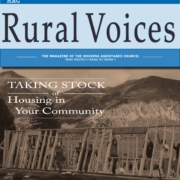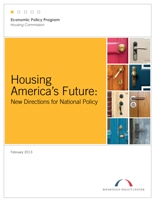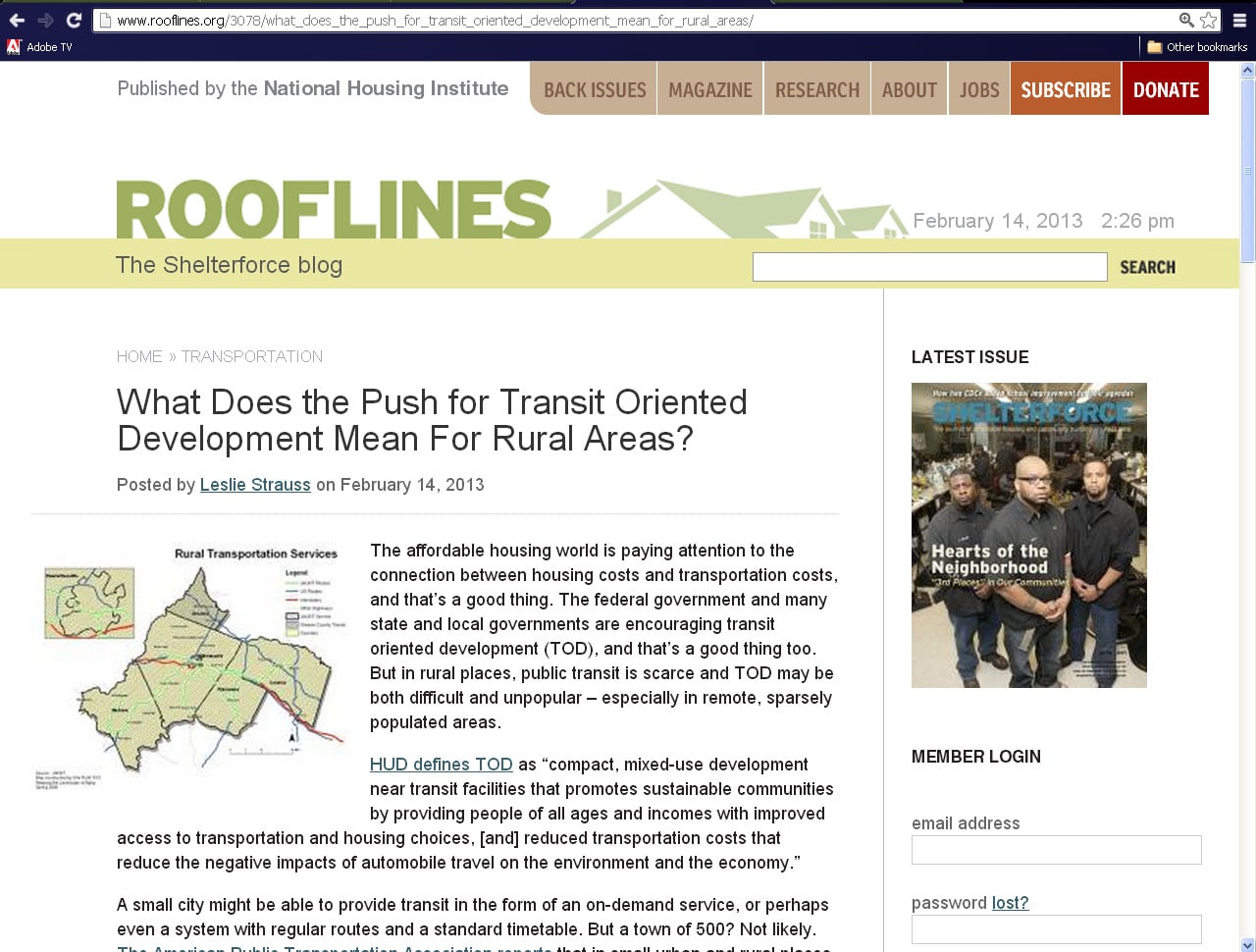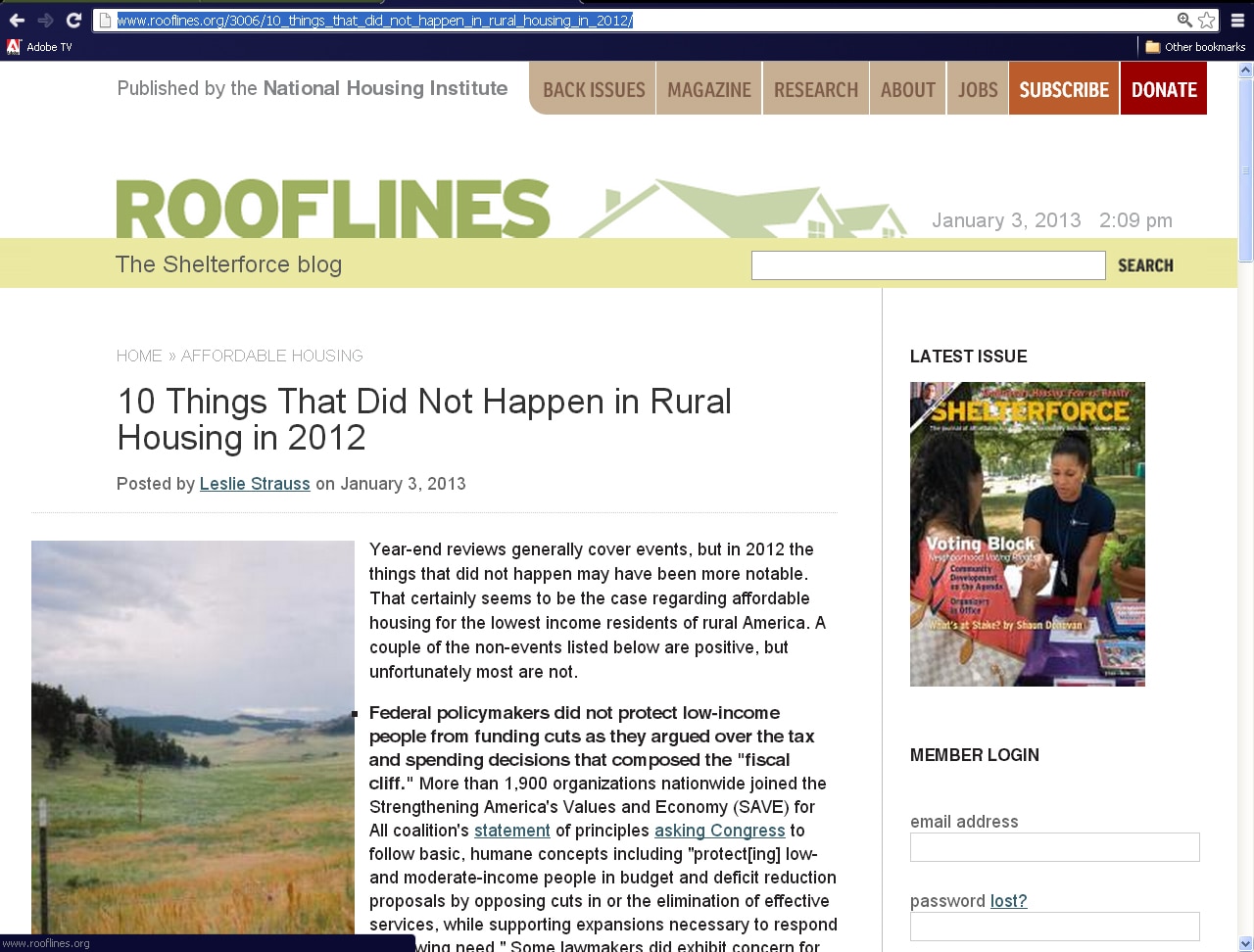HAC News Formats. pdf
November 7, 2012
Vol. 41, No. 22
• November is National Native American Heritage Month • November 10-18 is National Hunger and Homelessness Awareness Week • Rural housing on Senate Majority Leader’s list • Disaster recovery information available from USDA and HAC • VA offers funds to help families’ housing stability • LIHTC can serve extremely low-income tenants, research finds • Some income exclusions apply to USDA RD multifamily occupants • USDA RD offers guidance on using Section 538 loans for Section 515 properties • Treatment of farmworkers and others by large food companies varies, research finds • CBO reports on income tax’s effect on owning and renting • Child poverty increased in rural areas and nationwide from 2010 to 2011 • National Rural Housing Conference early bird registration deadline is November 9!
November 7, 2012
Vol. 41, No. 22
NOVEMBER IS NATIONAL NATIVE AMERICAN HERITAGE MONTH. President Obama’s proclamation also names November 23 (the day after Thanksgiving) Native American Heritage Day.
NOVEMBER 10-18 IS NATIONAL HUNGER AND HOMELESSNESS AWARENESS WEEK. Information about this annual event, sponsored by the National Coalition for the Homeless and the National Student Campaign Against Hunger and Homelessness, is posted online.
RURAL HOUSING ON SENATE MAJORITY LEADER’S LIST. The National Journal published a list of unfinished legislative items compiled by the staff of Majority Leader Harry Reid (D-NV) and noted there are too many to complete during Congress’s lame duck session, which will begin soon. “Rural housing” appears on the list without further explanation, probably referring to the effort to preserve eligibility for housing programs in places with growing populations. See HAC News, 9/26/12.
DISASTER RECOVERY INFORMATION AVAILABLE FROM USDA AND HAC. HAC has updated Picking up the Pieces, its guide to resources for rural housing in disaster areas, and published a Hurricane Sandy supplement. USDA is sending letters to Section 502 direct and guaranteed borrowers in and around the Hurricane Sandy disaster areas summarizing available loan servicing assistance, including possible payment moratoria for direct borrowers. Owners and renters in USDA assisted properties should contact USDA RD offices. Vacant houses and apartments with USDA financing may be available for hurricane survivors through FEMA, 800-621-FEMA. Additional federal disaster information is posted at https://www.disasterassistance.gov.
VA OFFERS FUNDS TO HELP FAMILIES’ HOUSING STABILITY. The Supportive Services for Veteran Families program makes grants to nonprofits, consumer coops, and Tribally Designated Housing Entities to provide or coordinate supportive services to very low-income veteran families to remain in or transition into permanent housing. Deadline is February 1, 2013. Contact John Kuhn, VA, 877-737-0111, SSVF@va.gov.
SOME INCOME EXCLUSIONS APPLY TO USDA RD MULTIFAMILY OCCUPANTS. An Unnumbered Letter (October 9, 2012) provides a copy of a July 24 HUD Federal Register notice (see HAC News, 7/25/12) listing exclusions to income for numerous programs, and announces that RD Handbook changes will be published soon. Contact Laura Horn, RD, 202-720-5443.
USDA RD OFFERS GUIDANCE ON USING SECTION 538 LOANS FOR SECTION 515 PROPERTIES. Section 538 guaranteed loans can finance revitalization of existing properties with Section 515 direct loans. An Unnumbered Letter (October 9, 2012) instructs USDA staff on reconciling procedural differences between the programs. Contact Tammy Daniels, RD, 202-720-0021.
TREATMENT OF FARMWORKERS AND OTHERS BY LARGE FOOD COMPANIES VARIES, RESEARCH FINDS. Worker Equity in Food and Agriculture, published by the Tellus Institute and Sustainalytics, examines wages and working conditions (not housing) at the 100 largest U.S. companies in food and agriculture. “Worker equity” is evaluated at the farm, factory, retail, and restaurant stages.
CBO REPORTS ON INCOME TAX’S EFFECT ON OWNING AND RENTING. A Congressional Budget Office working paper, “Taxation of Owner-Occupied and Rental Housing,” concludes that federal income tax advantages tend to make owning more advantageous than renting for higher-income households, but lower-income households can find renting cheaper than owning. The paper also examines how four different possible changes to the tax code (including repealing the mortgage interest deduction) would affect these calculations. Contact Larry Ozanne, CBO, larry.ozanne@cbo.gov.
CHILD POVERTY INCREASED IN RURAL AREAS AND NATIONWIDE FROM 2010 TO 2011. The Carsey Institute at the University of New Hampshire reports that American Community Survey data show 45% of U.S. children live below 200% of the poverty level, and 10.1% live below 50% of poverty. “Over Sixteen Million Children in Poverty in 2011” includes data for urban/rural/suburban geographies, regions, and states.
|
NATIONAL RURAL HOUSING CONFERENCE EARLY BIRD REGISTRATION DEADLINE IS NOVEMBER 9! The 2012 conference, “Promises to Keep in Challenging Times,” will be December 6-7, with pre-conference activities on December 5, at the Hyatt Regency Washington on Capitol Hill in Washington, DC. Register now to take advantage of the special early bird discount! Start networking in advance – join the conference LinkedIn group. Questions? Contact Dan Stern, HAC, dan@ruralhome.org or 202-842-8600.
|







